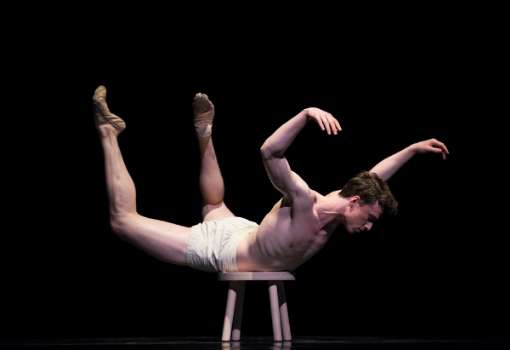Benjamin Freemantle is one of those dancers who stand out, even among the corps de ballet, for his purity and lyricism onstage. A young Irish dance champion in his native Canada, he later switched gears and at age 16 ended up in San Francisco Ballet’s training program. He joined the company and was promoted to soloist this year, after three seasons in the corps.
Freemantle is also flexing his choreography muscles, currently working with students from the San Francisco Ballet School on a new creation for their 2019 student showcase.
You’ve danced the work of a remarkable range of choreographers – 17 at my last count. What are some memorable experiences?
Lensky in Onegin: it was my first year as a corps de ballet dancer and I was handed this role by Reid Anderson. I really wanted to do this role even before I was cast. At the time, Norika Matsuyama was doing Olga and she didn’t have a partner. Reid came and picked me out from class to learn it. I loved every minute of the experience. Just thinking ahead to a time when all I would be doing were these types of roles was very exciting. Very thrilled to be at that point now, three years later.
And working with Trey McIntyre: that work was carefully sculpted but it was also very free in the way he choreographed – the way he did it came off as very organic and natural. He had a way of flowing through the choreography that almost felt as if he was improvising and I was replicating what he did. For all I know, it could have been fully choreographed, but definitely the feeling I got from him was that it kind of just happened.

Was that different from the way you’re used to working with most choreographers?
Yes, that was different. Sometimes they come in and have a very clear image of what they want, they know the choreography and the counts and everything.
Sometimes they come in and we improvise for them for a day or so then they pick out stylistic things that we do and build from that.
Rarely do you get a choreographer who doesn’t really plan anything and comes in and it all just kind of flows out of them very naturally.
It was just the two of us working on a solo together. We had three weeks with him but he actually finished the full ballet in five days. It was crazy. He used the time so well, did a brilliant job of directing it and pulling it together.
Who or what has inspired your choreography?
My first piece was for an SFB student performance – it was called Bare. It was a simple five-couple piece and very classical. After that, I knew I wanted to make more contemporary work. Alexander Ekman and Trey Mcintyre are among those who inspire my choreography.
For a recent audition [to get into a choreographic program], I had the idea to make a work around the concept of consent and power dynamics, mostly inspired by the culture in which we are living – in the world of Hollywood, the ballet world, and everywhere in life. To create the idea, I just went into a studio and worked out a solo for myself. I used the music of Benjamin Clementine and his song Adios.
On the subject of power and consent: the ballet world is now grappling with multiple allegations of abusive behavior – mainly by male dancers, teachers and directors. As more companies and schools around the world are facing up to longstanding problems with misogyny and harassment, how can you as a young male dancer and an up-and-coming choreographer make a difference?
Leading by example is the first place you have to start. Sticking up when you see wrong and teaching the tools for better communication on every end. Art is loud. You can say more with movement and a stage than you can in a speech. The beauty of art – dance, especially – is that everyone sees it through their own lens. They will connect with it and try to find meaning that will resonate with them. I can’t wait to be loud.
Tell me about your ventures into the Tenderloin, offering haircuts to the homeless.
We live and work right here in San Francisco in an area where we encounter the homeless every day. I really wanted to do something but how could I help?
I’m really good at cutting hair. I started cutting my own hair at the age of 16 after I outgrew my father’s haircuts. Living at Jackson House (the SFB school dorms), none of us really had the money for an expensive San Francisco haircut so I began offering them for free to everyone. Now I've cut hair for men and women in the company.
One day I just went out and offered a haircut to a guy on the street. At first he was a little suspicious but it went well. And I did that for a while and I think people appreciated it. You know, they are human like the rest of us and just need our compassion and whatever we can do for them.
I approached the city with my idea for the New Day Project – basically one day when we would organize a range of services for the homeless on the street: haircuts, new clothing, a hot meal, job help, medical testing. But the city pushed back on the idea, saying that all those things already existed. My idea was for them all to exist on one day, in one area. Hopefully a chance for them to start a new day.
Now I intend to start volunteering wherever I can so I can make the proper connections to make this a reality.


